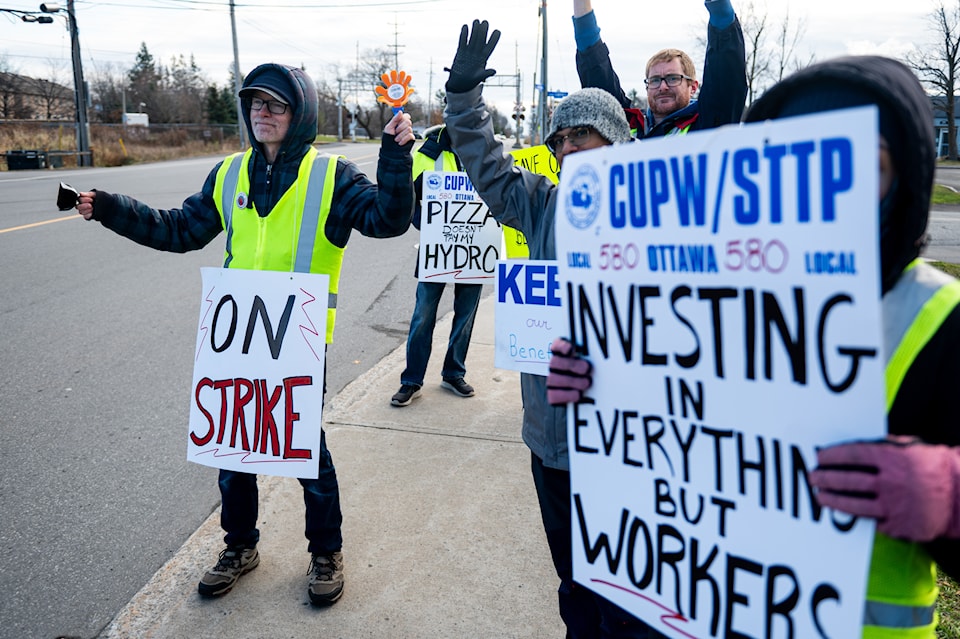A national strike by Canada Post workers, which began Friday, Nov. 15, has disrupted mail and parcel services across Canada, especially as the holiday season begins with more than 55,000 postal workers on strike.
The strike by the Canadian Union of Postal Workers (CUPW) has raised concerns about its impact on the Canadian economy, small businesses and remote communities, as deliveries remain halted and service guarantees are affected.
The union is pushing for improved wages, better health and safety conditions and the protection of pensions.
CUPW is also fighting against Canada Post's plan to restructure its workforce and elevate operations, arguing that it would create a second-class workforce.
They are also calling for expanded services to modernize Canada’s postal service, proposing initiatives such as elder check-ins, low-fee postal banking and electric vehicle deliveries as part of a "postal service of the future."
In a statement, CUPW emphasized its goal of negotiating fair collective agreements at the bargaining table, stating the best agreements are those reached through dialogue. Government mediators are now assisting negotiators in bargaining.
The union’s vision includes adapting Canada Post’s extensive network to meet the needs of today’s citizens, including providing low-fee banking services in underserved communities. These proposals, CUPW argues, would not only improve postal services but also help address pressing social issues, including climate change and the need for affordable banking options for Canadians.
Barry Eidlin, an associate professor at McGill University and expert in the labour movement, highlighted the importance of this strike as a pivotal moment in the future of the Crown corporation.
He said the disruption serves as a strategic effort by the union to address long-term issues, despite the immediate economic damage caused to small businesses relying on postal services.
“The strike is supposed to inflict economic damage to push Canada Post to the bargaining table,” Eidlin told Humber Et Cetera. “This is a last-ditch effort by the union after over a year of negotiations.”
In response to the ongoing strike, Canada Post acknowledged the challenges created by the strike, confirming it lost 42 per cent of its parcel volumes compared to last year and is concerned about growing competition from private delivery services.
Despite this, Canada Post remains committed to resolving the dispute through negotiations, with no plans for arbitration.
A special mediator, Peter Simpson, has been appointed by the Minister of Labour Steve MacKinnon, to assist both sides in reaching an agreement. The mediator’s role is to help identify common ground and create a resolution.
Canada Post and CUPW continue to meet under Simpson’s guidance, with discussions set to resume this week.
While CUPW has expressed its commitment to negotiating, Canada Post has put forward proposals that include wage increases, expanded paid leave and efforts to secure the future of the company by offering seven-day parcel delivery.
Canada Post has also proposed competitive pricing and infrastructure improvements to adapt to the growing parcel market, which it views as critical to its financial sustainability.
Eidlin emphasized the short-term disruption caused by the strike, particularly for small businesses and individuals who rely on Canada Post for shipping.
“Small businesses, especially those using the service for e-commerce, will face higher delivery costs as they turn to private couriers,” he said.
However, he said the union’s fight for improved working conditions and job security is in the long-term interest of both postal workers and the public.
While the strike affects Canadians’ trust in postal services, Eidlin believes there is growing public support for workers’ rights.
He said that over recent years, there has been a shift toward greater public sympathy for unions, as many Canadians recognize the importance of defending workers’ rights amid rising corporate power.
As the strike continues, Canadians are being advised that mail and parcels will not be processed or delivered until the dispute is resolved.
With no new parcels being accepted during the strike, service delays are expected to persist long after the action ends.
Eidlin said the pressure of the holiday season might accelerate the pace of talks, as both sides face mounting economic pressures.


